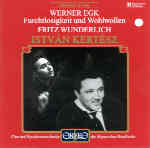Imagine the melodic grandeur and lush harmonies of Puccini mixed with the angularity and quirky structural sense of Stravinsky in his most Neo-classic phase: think Oedipus Rex or Symphony of Psalms, and that might give you a sense of the music of Werner Egk. In Furchtlosigkeit und Wohlwollen (Fearlessness and Goodwill), composed in 1930 when most of his countrymen were toeing the Schoenberg line, Egk favors melody over technique, harmnony and drama over political statement. At the time of the first performance it was heavily criticized–apparently few wanted to hear an Indian story told in the language of Wagner–but here it stands as a beautiful, unheralded work, carefully and lovingly committed to disc.
Egk has a gift for pacing, never allowing any section to get overlong or ponderous, and though he avoids direct repetition (save for the opening and closing movements, favored by the same scurrying string ositnato) he manages to make a coherent piece, full of intelligent invention. His vocal writing is exquisite, graced with long, singable melodies (crisply executed by the redoubtable Fritz Wunderlich), and his sense of harmony is both exotic and grounded. The longest movement, “Unterwegs Kamen sie in einen Wald”, which clocks in at a mere 10:35, is a labyrinth of musical twists and turns, always exciting, mediating between loud orchestral crashes and lilting solo woodwind passages. Despite its subject matter, there is one moment where the piece even comes close to “Indian” music: the section called “Sie brachten Gammani in die Mitte des Platzes”. It is a tasteful flirtation, never insulting or thrill-seeking.
Egk has a splendid ear for the orchestra, obvious even from this 1959 mono recording (under the sturdy baton of István Kertész leading the Bavarian Symphony Orchestra and Chorus). The only drawback to this release, aside from the slightly off-putting sound quality, is the fact that the libretto is available only in German. But don’t let that stop you; it really is worth a good listen.
































